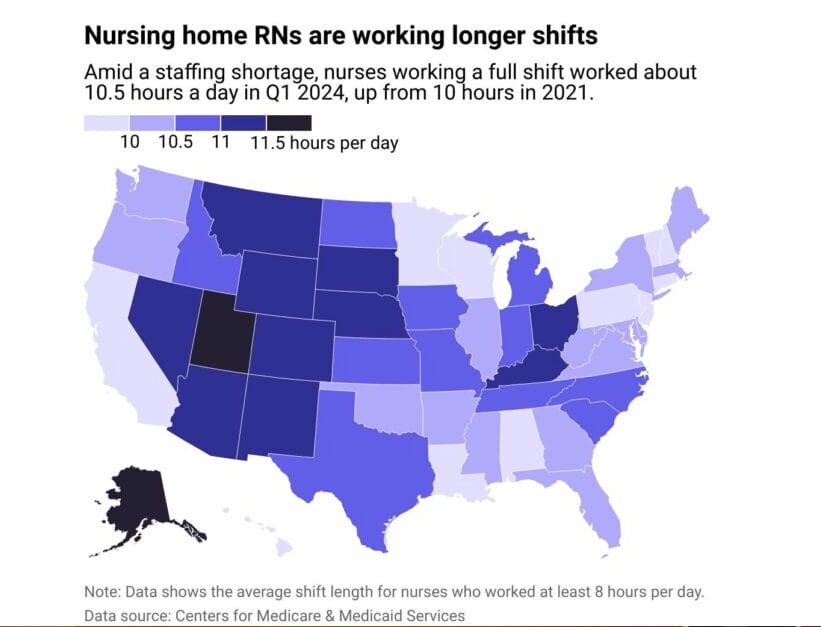Long-term care registered nurses in Alaska and Utah are working the longest hours of any state, putting them at greatest risk of burnout and increased fatigue, according to a new report from Vivian Health.
Nationwide, the average full shift for a nursing home RN was 10.5 hours per day in the first quarter of 2024, compared to 10 hours in 2021, the staffing agency noted. RNs in an even dozen states had average shifts lasting 11 hours or more, according to the most recently available payroll data from the Centers for Medicare & Medicaid Services.
Vivian noted that nurses working in nursing homes in Alaska averaged shifts of 11.9 hours, while those in Utah worked shifts averaging 11.8 hours. Kentucky, Montana and Nevada also were among the longest-shift group.
California, Louisiana, Pennsylvania, New Jersey, Minnesota, and Wisconsin were among the states where LTC nurses are working the shortest shifts, with an average of less than 10 hours, per the report.
Report authors said that states with large rural areas have struggled the most to overcome the challenge of an uneven distribution of workers.

“Utah has fewer than seven nurses per 1000 people and nearly 3,000 unfilled nursing positions,” Allison Spangler, president of the Utah Health Care Association, told McKnight’s Long-Term Care News on Friday. “When faced with a workforce crisis, providers must adapt how they utilize their staff. In all healthcare spaces, it is critical to recruit and hire competent caregivers so we can provide quality and consistent care to those we serve.”
The Vivian Health report, which was released last week, said that Alaska is facing a “severe nursing shortage” and that it has more than 1,500 reported vacancies for RN positions. The number is expected to grow to more than 5,000 vacancies by 2030, report authors added.
A new law enacted in July 2024 gives nurses whose Alaska licenses have lapsed a six-month, nonrenewable permit to work while they are in the process of having their license reinstated, according to a report from Alaska News Source. Glenn Saviers, deputy director of the Alaska Division of Corporations, Business, and Professional Licensing, said the law “removes unnecessary red tape in making qualified nurses eligible for work in Alaska faster.”
Nursing homes nationwide continue grappling with a historic staffing shortage that has shown little sign of letting up even as the federal government imposed mandatory staffing ratios.
“A quarter of all nursing homes in the United States in recent years reported ‘critical’ staff shortages amid growing demand from an aging population for long-term health care,” Vivian Health wrote in the report. “Long work shifts and staffing shortages can lead to burnout, distress and illness among nurses — but they also tend to lower the quality-of-care patients receive. Nurses working longer shifts may experience increased fatigue, which can lead to errors that impact patient safety and experience. Staffing shortages have even been associated with increases in patient mortality rates.”
The report also said that more than one in 10 nurses reported having a second job while newly licensed nurses are working 12-hour shifts in addition to voluntary and mandatory overtime.
Source link : http://www.bing.com/news/apiclick.aspx?ref=FexRss&aid=&tid=66d3467051de45a3970225a1c44be21b&url=https%3A%2F%2Fwww.mcknights.com%2Fnews%2Faverage-ltc-nurse-shift-rises-to-10-5-hours-alaska-utah-working-longest-federal-data-show%2F&c=7835787912416105045&mkt=en-us
Author :
Publish date : 2024-08-30 13:00:00
Copyright for syndicated content belongs to the linked Source.
